美国陆军军官1-01-001:美国陆军军官的服役誓言
- 格式:docx
- 大小:15.84 KB
- 文档页数:1

美军五大军歌蕴含的军人价值观古今中外,不同的历史时期、不同国家民族的军队,无不具有一个共同的传统,那就是都有属于自己的军歌。
军歌是由军队正式规定的代表本军队的歌曲,军人价值观在军歌中能得到最充分的体现。
对于军队来说,职业的特殊化注定军人要具有特定的价值观。
例如我军各大军种的军歌体现着“忠诚于党、热爱人民、报效国家、献身使命、崇尚荣誉”的军人核心价值观。
而美军的五大军歌是指陆军的《陆军永往直前》(the army goes rolling along)、海军的《起锚》(anchors aweigh)、空军的《空军歌》(wild, blue, yonder!)、海军陆战队的《海军陆战队赞歌》(marines’ hymn)以及海岸警卫队的《时刻准备着》(semper paratus)。
它们也都结合自身特点,把军人价值观糅合在各自军歌中。
一、忠诚忠诚于国家理念是美军军人价值观中最根本的一条。
美军将领马歇尔说:“忠诚是一个军队最大的财富,但是没有谁能靠嘴说做到对军队的忠诚。
”美军指出,对于真正的职业军人来说,对国家理念的忠诚意味着服务并保护美国《独立宣言》和《美国宪法》中所有的自由、正义、真理和平等的信仰。
对国家理念的忠诚是美军其它价值观的基础,自独立战争以来,美军就一直在保护这些理念而前赴后继,这也是军队不可推卸的责任。
美军的各大军种的军歌就很好的体现了这一点,例如《海军陆战队赞歌》(marines’ hymn)中的“我们为国家而战,在空中、陆地和大海上,首先为正义和自由而战”;《空军歌》(wild, blue, yonder!)里的“首先为正义而战,建立国家的权力”都展现了有关国家忠诚的内容。
二、责任美陆军前参谋长约翰·a·威克汉姆指出:“责任的精髓在于,没有命令或指示的情况下,基于内在的,为正确的道德和职业判断而行动。
”责任是对忠诚的基本表述,它要求每个人都要为自己所忠诚的事业负责。
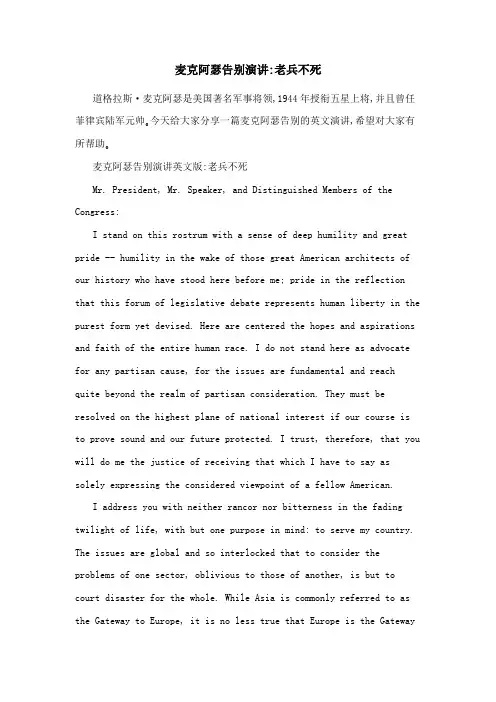
麦克阿瑟告别演讲:老兵不死道格拉斯·麦克阿瑟是美国著名军事将领,1944年授衔五星上将,并且曾任菲律宾陆军元帅。今天给大家分享一篇麦克阿瑟告别的英文演讲,希望对大家有所帮助。麦克阿瑟告别演讲英文版:老兵不死Mr. President, Mr. Speaker, and Distinguished Members of the Congress:I stand on this rostrum with a sense of deep humility and great pride -- humility in the wake of those great American architects of our history who have stood here before me; pride in the reflection that this forum of legislative debate represents human liberty in the purest form yet devised. Here are centered the hopes and aspirations and faith of the entire human race. I do not stand here as advocate for any partisan cause, for the issues are fundamental and reach quite beyond the realm of partisan consideration. They must be resolved on the highest plane of national interest if our course is to prove sound and our future protected. I trust, therefore, that you will do me the justice of receiving that which I have to say assolely expressing the considered viewpoint of a fellow American.I address you with neither rancor nor bitterness in the fading twilight of life, with but one purpose in mind: to serve my country. The issues are global and so interlocked that to consider the problems of one sector, oblivious to those of another, is but to court disaster for the whole. While Asia is commonly referred to as the Gateway to Europe, it is no less true that Europe is the Gatewayto Asia, and the broad influence of the one cannot fail to have its impact upon the other. There are those who claim our strength is inadequate to protect on both fronts, that we cannot divide our effort. I can think of no greater expression of defeatism. If a potential enemy can divide his strength on two fronts, it is for usto counter his effort. The Communist threat is a global one. Its successful advance in one sector threatens the destruction of every other sector. You can not appease or otherwise surrender to communism in Asia without simultaneously undermining our efforts to halt its advance in Europe.Beyond pointing out these general truisms, I shall confine my discussion to the general areas of Asia. Before one may objectively assess the situation now existing there, he must comprehend something of Asia's past and the revolutionary changes which have marked her course up to the present. Long exploited by the so-called colonial powers, with little opportunity to achieve any degree of social justice, individual dignity, or a higher standard of life such as guided our own noble administration in the Philippines, the peoplesof Asia found their opportunity in the war just past to throw off the shackles of colonialism and now see the dawn of new opportunity, a heretofore unfelt dignity, and the self-respect of political freedom.Mustering half of the earth's population, and 60 percent of its natural resources these peoples are rapidly consolidating a new force, both moral and material, with which to raise the living standard and erect adaptations of the design of modern progress to their owndistinct cultural environments. Whether one adheres to the concept ofcolonization or not, this is the direction of Asian progress and it may not be stopped. It is a corollary to the shift of the world economic frontiers as the whole epicenter of world affairs rotates back toward the area whence it started.In this situation, it becomes vital that our own country orientits policies in consonance with this basic evolutionary condition rather than pursue a course blind to the reality that the colonialera is now past and the Asian peoples covet the right to shape their own free destiny. What they seek now is friendly guidance, understanding, and support -- not imperious direction -- the dignityof equality and not the shame of subjugation. Their pre-war standardof life, pitifully low, is infinitely lower now in the devastationleft in war's wake. World ideologies play little part in Asianthinking and are little understood. What the peoples strive for isthe opportunity for a little more food in their stomachs, a little better clothing on their backs, a little firmer roof over their heads, and the realization of the normal nationalist urge for political freedom. These political-social conditions have but an indirect bearing upon our own national security, but do form a backdrop to contemporary planning which must be thoughtfully considered if we are to avoid the pitfalls of unrealism.Of more direct and immediate bearing upon our national securityare the changes wrought in the strategic potential of the Pacific Ocean in the course of the past war. Prior thereto the western strategic frontier of the United States lay on the littoral line of the Americas, with an exposed island salient extending out throughHawaii, Midway, and Guam to the Philippines. That salient proved not an outpost of strength but an avenue of weakness along which the enemy could and did attack.The Pacific was a potential area of advance for any predatory force intent upon striking at the bordering land areas. All this was changed by our Pacific victory. Our strategic frontier then shifted to embrace the entire Pacific Ocean, which became a vast moat to protect us as long as we held it. Indeed, it acts as a protective shield for all of the Americas and all free lands of the Pacific Ocean area. We control it to the shores of Asia by a chain of islands extending in an arc from the Aleutians to the Mariannas held by us and our free allies. From this island chain we can dominate with sea and air power every Asiatic port from Vladivostok to Singapore -- with sea and air power every port, as I said, from Vladivostok to Singapore -- and prevent any hostile movement into the Pacific.*Any predatory attack from Asia must be an amphibious effort.* No amphibious force can be successful without control of the sea lanes and the air over those lanes in its avenue of advance. With naval and air supremacy and modest ground elements to defend bases, any major attack from continental Asia toward us or our friends in the Pacific would be doomed to failure.Under such conditions, the Pacific no longer represents menacing avenues of approach for a prospective invader. It assumes, instead, the friendly aspect of a peaceful lake. Our line of defense is a natural one and can be maintained with a minimum of military effort and expense. It envisions no attack against anyone, nor does itprovide the bastions essential for offensive operations, but properly maintained, would be an invincible defense against aggression. The holding of this littoral defense line in the western Pacific is entirely dependent upon holding all segments thereof; for any major breach of that line by an unfriendly power would render vulnerable to determined attack every other major segment.This is a military estimate as to which I have yet to find a military leader who will take exception. For that reason, I have strongly recommended in the past, as a matter of military urgency,that under no circumstances must Formosa fall under Communist control. Such an eventuality would at once threaten the freedom of the Philippines and the loss of Japan and might well force our western frontier back to the coast of California, Oregon and Washington.To understand the changes which now appear upon the Chinese mainland, one must understand the changes in Chinese character and culture over the past 50 years. China, up to 50 years ago, was completely non-homogenous, being compartmented into groups divided against each other. The war-making tendency was almost non-existent, as they still followed the tenets of the Confucian ideal of pacifist culture. At the turn of the century, under the regime of Chang Tso Lin, efforts toward greater homogeneity produced the start of a nationalist urge. This was further and more successfully developed under the leadership of Chiang Kai-Shek, but has been brought to its greatest fruition under the present regime to the point that it has now taken on the character of a united nationalism of increasingly dominant, aggressive tendencies.Through these past 50 years the Chinese people have thus become militarized in their concepts and in their ideals. They nowconstitute excellent soldiers, with competent staffs and commanders. This has produced a new and dominant power in Asia, which, for its own purposes, is allied with Soviet Russia but which in its own concepts and methods has become aggressively imperialistic, with alust for expansion and increased power normal to this type of imperialism.There is little of the ideological concept either one way or another in the Chinese make-up. The standard of living is so low and the capital accumulation has been so thoroughly dissipated by warthat the masses are desperate and eager to follow any leadershipwhich seems to promise the alleviation of local stringencies.I have from the beginning believed that the Chinese Communists' support of the North Koreans was the dominant one. Their interests are, at present, parallel with those of the Soviet. But I believethat the aggressiveness recently displayed not only in Korea but also in Indo-China and Tibet and pointing potentially toward the South reflects predominantly the same lust for the expansion of power which has animated every would-be conqueror since the beginning of time.The Japanese people, since the war, have undergone the greatest reformation recorded in modern history. With a commendable will, eagerness to learn, and marked capacity to understand, they have,from the ashes left in war's wake, erected in Japan an edifice dedicated to the supremacy of individual liberty and personal dignity; and in the ensuing process there has been created a trulyrepresentative government committed to the advance of political morality, freedom of economic enterprise, and social justice.Politically, economically, and socially Japan is now abreast of many free nations of the earth and will not again fail the universal trust. That it may be counted upon to wield a profoundly beneficial influence over the course of events in Asia is attested by the magnificent manner in which the Japanese people have met the recent challenge of war, unrest, and confusion surrounding them from the outside and checked communism within their own frontiers without the slightest slackening in their forward progress. I sent all four of our occupation divisions to the Korean battlefront without the slightest qualms as to the effect of the resulting power vacuum upon Japan. The results fully justified my faith. I know of no nation more serene, orderly, and industrious, nor in which higher hopes can be entertained for future constructive service in the advance of the human race.Of our former ward, the Philippines, we can look forward in confidence that the existing unrest will be corrected and a strong and healthy nation will grow in the longer aftermath of war'sterrible destructiveness. We must be patient and understanding and never fail them -- as in our hour of need, they did not fail us. A Christian nation, the Philippines stand as a mighty bulwark of Christianity in the Far East, and its capacity for high moral leadership in Asia is unlimited.On Formosa, the government of the Republic of China has had the opportunity to refute by action much of the malicious gossip which soundermined the strength of its leadership on the Chinese mainland.The Formosan people are receiving a just and enlightenedadministration with majority representation on the organs of government, and politically, economically, and socially they appearto be advancing along sound and constructive lines.With this brief insight into the surrounding areas, I now turn to the Korean conflict. While I was not consulted prior to thePresident's decision to intervene in support of the Republic of Korea, that decision from a military standpoint, proved a sound one, as we -- as I said, proved a sound one, as we hurled back the invader and decimated his forces. Our victory was complete, and our objectives within reach, when Red China intervened with numerically superior ground forces.This created a new war and an entirely new situation, a situation not contemplated when our forces were committed against the North Korean invaders; a situation which called for new decisions in the diplomatic sphere to permit the realistic adjustment of military strategy.Such decisions have not been forthcoming.While no man in his right mind would advocate sending our ground forces into continental China, and such was never given a thought,the new situation did urgently demand a drastic revision of strategic planning if our political aim was to defeat this new enemy as we had defeated the old.Apart from the military need, as I saw It, to neutralize the sanctuary protection given the enemy north of the Yalu, I felt thatmilitary necessity in the conduct of the war made necessary: first the intensification of our economic blockade against China; two the imposition of a naval blockade against the China coast; three removal of restrictions on air reconnaissance of China's coastal areas and of Manchuria; four removal of restrictions on the forces of the Republic of China on Formosa, with logistical support to contribute to their effective operations against the common enemy.For entertaining these views, all professionally designed to support our forces committed to Korea and bring hostilities to an end with the least possible delay and at a saving of countless American and allied lives, I have been severely criticized in lay circles, principally abroad, despite my understanding that from a military standpoint the above views have been fully shared in the past by practically every military leader concerned with the Korean campaign, including our own Joint Chiefs of Staff.I called for reinforcements but was informed that reinforcements were not available. I made clear that if not permitted to destroy the enemy built-up bases north of the Yalu, if not permitted to utilize the friendly Chinese Force of some 600,000 men on Formosa, if not permitted to blockade the China coast to prevent the Chinese Reds from getting succor from without, and if there were to be no hope of major reinforcements, the position of the command from the military standpoint forbade victory.We could hold in Korea by constant maneuver and in an approximate area where our supply line advantages were in balance with the supply line disadvantages of the enemy, but we could hope at best for onlyan indecisive campaign with its terrible and constant attrition upon our forces if the enemy utilized its full military potential. I have constantly called for the new political decisions essential to a solution.Efforts have been made to distort my position. It has been said,in effect, that I was a warmonger. Nothing could be further from the truth. I know war as few other men now living know it, and nothing to me is more revolting. I have long advocated its complete abolition,as its very destructiveness on both friend and foe has rendered it useless as a means of settling international disputes. Indeed, on the second day of September, nineteen hundred and forty-five, just following the surrender of the Japanese nation on the Battleship Missouri, I formally cautioned as follows:Men since the beginning of time have sought peace. Variousmethods through the ages have been attempted to devise aninternational process to prevent or settle disputes between nations. From the very start workable methods were found in so far asindividual citizens were concerned, but the mechanics of an instrumentality of larger international scope have never been successful. Military alliances, balances of power, Leagues of Nations, all in turn failed, leaving the only path to be by way of thecrucible of war. The utter destructiveness of war now blocks out this alternative. We have had our last chance. If we will not devise some greater and more equitable system, Armageddon will be at our door.The problem basically is theological and involves a spiritual recrudescence and improvement of human character that willsynchronize with our almost matchless advances in science, art, literature, and all material and cultural developments of the past2XXX years. It must be of the spirit if we are to save the flesh.But once war is forced upon us, there is no other alternative than to apply every available means to bring it to a swift end.War's very object is victory, not prolonged indecision.In war there is no substitute for victory.There are some who, for varying reasons, would appease Red China. They are blind to history's clear lesson, for history teaches with unmistakable emphasis that appeasement but begets new and bloodier war. It points to no single instance where this end has justifiedthat means, where appeasement has led to more than a sham peace. Like blackmail, it lays the basis for new and successively greater demands until, as in blackmail, violence becomes the only other alternative."Why," my soldiers asked of me, "surrender military advantages to an enemy in the field?" I could not answer.Some may say: to avoid spread of the conflict into an all-out war with China; others, to avoid Soviet intervention. Neither explanation seems valid, for China is already engaging with the maximum power it can commit, and the Soviet will not necessarily mesh its actions with our moves. Like a cobra, any new enemy will more likely strike whenever it feels that the relativity in military or other potential is in its favor on a world-wide basis.The tragedy of Korea is further heightened by the fact that its military action is confined to its territorial limits. It condemns that nation, which it is our purpose to save, to suffer thedevastating impact of full naval and air bombardment while theenemy's sanctuaries are fully protected from such attack and devastation.Of the nations of the world, Korea alone, up to now, is the sole one which has risked its all against communism. The magnificence of the courage and fortitude of the Korean people defies description.They have chosen to risk death rather than slavery. Their last words to me were: "Don't scuttle the Pacific!"I have just left your fighting sons in Korea. They have met all tests there, and I can report to you without reservation that they are splendid in every way.It was my constant effort to preserve them and end this savage conflict honorably and with the least loss of time and a minimum sacrifice of life. Its growing bloodshed has caused me the deepest anguish and anxiety.Those gallant men will remain often in my thoughts and in my prayers always.I am closing my 52 years of military service. When I joined the Army, even before the turn of the century, it was the fulfillment of all of my boyish hopes and dreams. The world has turned over many times since I took the oath on the plain at West Point, and the hopes and dreams have long since vanished, but I still remember the refrain of one of the most popular barrack ballads of that day which proclaimed most proudly that "old soldiers never die; they just fade away."And like the old soldier of that ballad, I now close my military career and just fade away, an old soldier who tried to do his duty as God gave him the light to see that duty.Good Bye.。

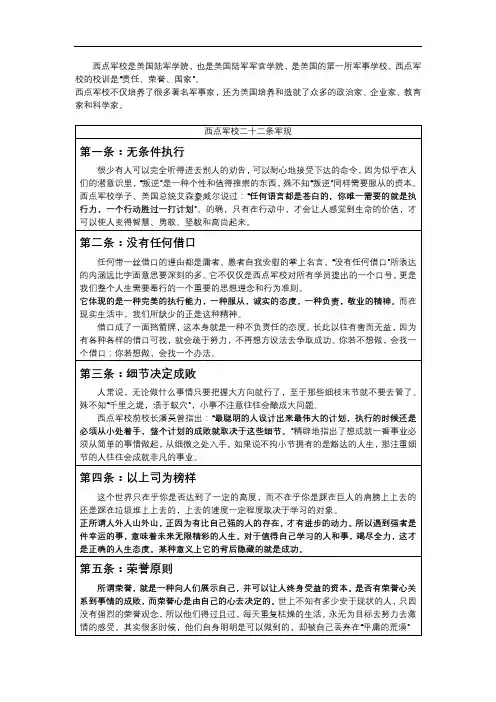
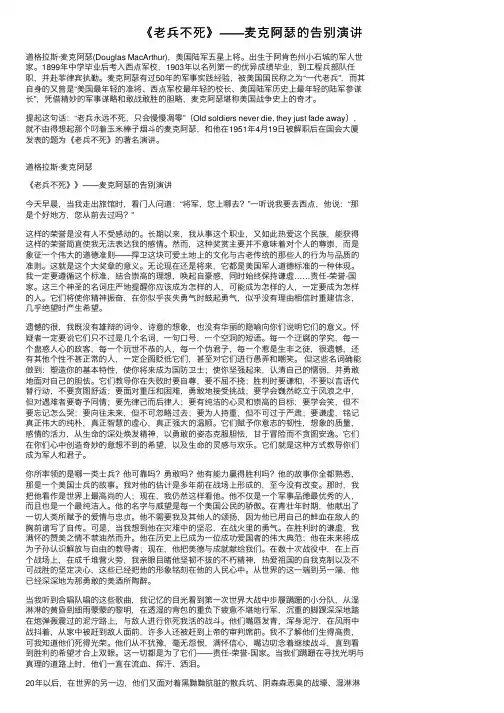
《⽼兵不死》——麦克阿瑟的告别演讲道格拉斯·麦克阿瑟(Douglas MacArthur),美国陆军五星上将。
出⽣于阿肯⾊州⼩⽯城的军⼈世家。
1899年中学毕业后考⼊西点军校,1903年以名列第⼀的优异成绩毕业,到⼯程兵部队任职,并赴菲律宾执勤。
麦克阿瑟有过50年的军事实践经验,被美国国民称之为“⼀代⽼兵”,⽽其⾃⾝的⼜曾是“美国最年轻的准将、西点军校最年轻的校长、美国陆军历史上最年轻的陆军参谋长”,凭借精妙的军事谋略和敢战敢胜的胆略,麦克阿瑟堪称美国战争史上的奇才。
提起这句话:“⽼兵永远不死,只会慢慢凋零”(Old soldiers never die, they just fade away),就不由得想起那个叼着⽟⽶棒⼦烟⽃的麦克阿瑟,和他在1951年4⽉19⽇被解职后在国会⼤厦发表的题为《⽼兵不死》的著名演讲。
道格拉斯·麦克阿瑟《⽼兵不死》》——麦克阿瑟的告别演讲今天早晨,当我⾛出旅馆时,看门⼈问道:“将军,您上哪去?”⼀听说我要去西点,他说:“那是个好地⽅,您从前去过吗?”这样的荣誉是没有⼈不受感动的。
长期以来,我从事这个职业,⼜如此热爱这个民族,能获得这样的荣誉简直使我⽆法表达我的感情。
然⽽,这种奖赏主要并不意味着对个⼈的尊崇,⽽是象征⼀个伟⼤的道德准则——捍卫这块可爱⼟地上的⽂化与古⽼传统的那些⼈的⾏为与品质的准则。
这就是这个⼤奖章的意义。
⽆论现在还是将来,它都是美国军⼈道德标准的⼀种体现。
我⼀定要遵循这个标准,结合崇⾼的理想,唤起⾃豪感,同时始终保持谦虚……责任-荣誉-国家。
这三个神圣的名词庄严地提醒你应该成为怎样的⼈,可能成为怎样的⼈,⼀定要成为怎样的⼈。
它们将使你精神振奋,在你似乎丧失勇⽓时⿎起勇⽓,似乎没有理由相信时重建信念,⼏乎绝望时产⽣希望。
遗憾的很,我既没有雄辩的词令、诗意的想象,也没有华丽的隐喻向你们说明它们的意义。
怀疑者⼀定要说它们只不过是⼏个名词,⼀句⼝号,⼀个空洞的短语。
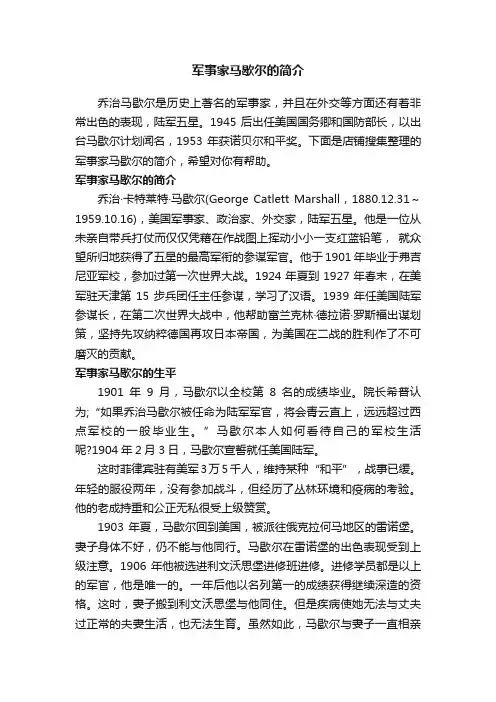
军事家马歇尔的简介乔治马歇尔是历史上著名的军事家,并且在外交等方面还有着非常出色的表现,陆军五星。
1945后出任美国国务卿和国防部长,以出台马歇尔计划闻名,1953年获诺贝尔和平奖。
下面是店铺搜集整理的军事家马歇尔的简介,希望对你有帮助。
军事家马歇尔的简介乔治·卡特莱特·马歇尔(George Catlett Marshall,1880.12.31~1959.10.16),美国军事家、政治家、外交家,陆军五星。
他是一位从未亲自带兵打仗而仅仅凭藉在作战图上挥动小小一支红蓝铅笔,就众望所归地获得了五星的最高军衔的参谋军官。
他于1901年毕业于弗吉尼亚军校,参加过第一次世界大战。
1924年夏到1927年春末,在美军驻天津第15步兵团任主任参谋,学习了汉语。
1939年任美国陆军参谋长,在第二次世界大战中,他帮助富兰克林·德拉诺·罗斯福出谋划策,坚持先攻纳粹德国再攻日本帝国,为美国在二战的胜利作了不可磨灭的贡献。
军事家马歇尔的生平1901年9月,马歇尔以全校第8名的成绩毕业。
院长希普认为;“如果乔治马歇尔被任命为陆军军官,将会青云直上,远远超过西点军校的一般毕业生。
”马歇尔本人如何看待自己的军校生活呢?1904年2月3日,马歇尔宣誓就任美国陆军。
这时菲律宾驻有美军3万5千人,维持某种“和平”,战事已缓。
年轻的服役两年,没有参加战斗,但经历了丛林环境和疫病的考验。
他的老成持重和公正无私很受上级赞赏。
1903年夏,马歇尔回到美国,被派往俄克拉何马地区的雷诺堡。
妻子身体不好,仍不能与他同行。
马歇尔在雷诺堡的出色表现受到上级注意。
1906年他被选进利文沃思堡进修班进修。
进修学员都是以上的军官,他是唯一的。
一年后他以名列第一的成绩获得继续深造的资格。
这时,妻子搬到利文沃思堡与他同住。
但是疾病使她无法与丈夫过正常的夫妻生活,也无法生育。
虽然如此,马歇尔与妻子一直相亲相爱,外人以为他们的婚姻生活完美无缺。
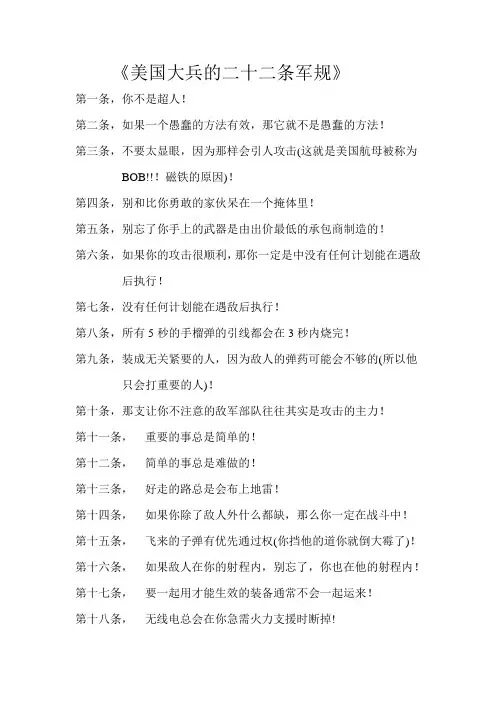
《美国大兵的二十二条军规》
第一条,你不是超人!
第二条,如果一个愚蠢的方法有效,那它就不是愚蠢的方法!
第三条,不要太显眼,因为那样会引人攻击(这就是美国航母被称为BOB!!!磁铁的原因)!
第四条,别和比你勇敢的家伙呆在一个掩体里!
第五条,别忘了你手上的武器是由出价最低的承包商制造的!
第六条,如果你的攻击很顺利,那你一定是中没有任何计划能在遇敌后执行!
第七条,没有任何计划能在遇敌后执行!
第八条,所有5秒的手榴弹的引线都会在3秒内烧完!
第九条,装成无关紧要的人,因为敌人的弹药可能会不够的(所以他只会打重要的人)!
第十条,那支让你不注意的敌军部队往往其实是攻击的主力!
第十一条,重要的事总是简单的!
第十二条,简单的事总是难做的!
第十三条,好走的路总是会布上地雷!
第十四条,如果你除了敌人外什么都缺,那么你一定在战斗中!第十五条,飞来的子弹有优先通过权(你挡他的道你就倒大霉了)!第十六条,如果敌人在你的射程内,别忘了,你也在他的射程内!第十七条,要一起用才能生效的装备通常不会一起运来!
第十八条,无线电总会在你急需火力支援时断掉!
第十九条,你做的任何事情都有可能让你挨枪子,你什么不做也一样!
第二十条,唯一比敌军炮火精准的就是友军的炮火!
第二十一条,专业士兵的行为是可以预测的,但世上却充满了业余玩家!
第二十二条,当两军都觉得自己愉快时,那他们也许都是对的!。
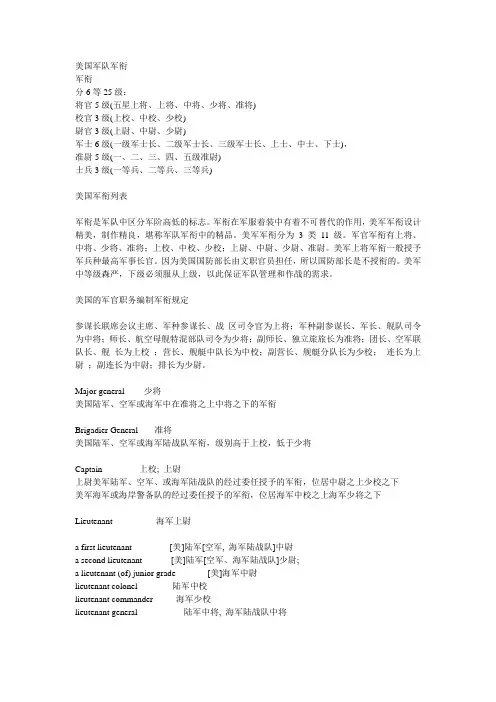
美国军队军衔军衔分6等25级:将官5级(五星上将、上将、中将、少将、准将)校官3级(上校、中校、少校)尉官3级(上尉、中尉、少尉)军士6级(一级军士长、二级军士长、三级军士长、上士、中士、下士),准尉5级(一、二、三、四、五级准尉)士兵3级(一等兵、二等兵、三等兵)美国军衔列表军衔是军队中区分军阶高低的标志。
军衔在军服着装中有着不可替代的作用,美军军衔设计精美,制作精良,堪称军队军衔中的精品。
美军军衔分为3类11 级。
军官军衔有上将、中将、少将、准将;上校、中校、少校;上尉、中尉、少尉、准尉。
美军上将军衔一般授予军兵种最高军事长官。
因为美国国防部长由文职官员担任,所以国防部长是不授衔的。
美军中等级森严,下级必须服从上级,以此保证军队管理和作战的需求。
美国的军官职务编制军衔规定参谋长联席会议主席、军种参谋长、战区司令官为上将;军种副参谋长、军长、舰队司令为中将;师长、航空母舰特混部队司令为少将;副师长、独立旅旅长为准将;团长、空军联队长、舰长为上校;营长、舰艇中队长为中校;副营长、舰艇分队长为少校;连长为上尉;副连长为中尉;排长为少尉。
Major general ------少将美国陆军、空军或海军中在准将之上中将之下的军衔Brigadier General -----准将美国陆军、空军或海军陆战队军衔,级别高于上校,低于少将Captain ------------上校; 上尉上尉美军陆军、空军、或海军陆战队的经过委任授予的军衔,位居中尉之上少校之下美军海军或海岸警备队的经过委任授予的军衔,位居海军中校之上海军少将之下Lieutenant---------------海军上尉a first lieutenant-------------[美]陆军[空军, 海军陆战队]中尉a second lieutenant----------[美]陆军[空军、海军陆战队]少尉;a lieutenant (of) junior grade-----------[美]海军中尉lieutenant colonel------------陆军中校lieutenant commander--------海军少校lieutenant general----------------陆军中将, 海军陆战队中将军官军衔有上将、中将、少将、准将;上校、中校、少校;上尉、中尉、少尉、准尉上将――――― General中将―――――Lieutenant general少将―――――Major general上校―――――Captain一、U.S.ARMY(U.S.A)[美国陆军](一)、General Officer(GO)[将官]1、General of the Army(GENA)〈O—11〉[五星上将]2、General(GEN)〈O—10〉[上将]3、Lieutenant General(LGEN)〈O—9〉[中将]4、Major General(MGEN)〈O—8〉[少将]5、Brigade General(BGEN)〈O—7〉[准将](二)、Company Officer(CO)[校官]6、Colonel(COL)〈O—6〉[上校]7、Lieutenant Colonel(LTC)〈O—5〉[中校]8、Major(MAJ)〈O—4〉[少校](三)、Field Officer(FO)[尉官]9、Captain(CPT)〈O—3〉[上尉]10、First Lieutenant(1LT)〈O—2〉[中尉]11、Second Lieutenant(2LT)〈O—1〉[少尉] (四)、Warrant Officer(WO)[准尉]12、Chief Warrant Officer W-5(CWO5)〈W—5〉[五级准尉]13、Chief Warrant Officer W-4(CWO4)〈W—4〉[四级准尉]14、Chief Warrant Officer W-3(CWO3)〈W—3〉[三级准尉]15、Chief Warrant Officer W-2(CWO2)〈W—2〉[二级准尉]16、Warrant Officer W-2(WO1)〈W—1〉[一级准尉](五)、Sergeant Major(SM)[士官]17、Sergeant Major of the Army(SMA)〈E—10〉[总军士长]18、Command Sergeant Major(CSM)〈E—9〉[指挥军士长]19、Sergeant Major(SGM)〈E—9〉[一级军士长]20、{陆军无此等级}〈E—9〉21、First Sergeant(FSG)〈E—8〉[二级军士长]22、Master Sergeant(MSG)〈E—8〉[二级军士长](六)、Sergeant(SG)[军士]23、Sergeant First Class(SFC)〈E—7〉[三级军士长]24、{陆军无此等级}〈E—7〉25、Staff Sergeant(SSG)〈E—6〉[上士]26、Sergeant(SGT)〈E—5〉[中士] (七)、Private(PV)[兵]27、Corporal(CPL)〈E—4〉[下士]28、Specialist(SPT)〈E—4〉[专业下士]29、Private First Class(PFC)〈E—3〉[一等兵]30、Private E-2(PV2)〈E—2〉[二等兵]31、Private E-1(PV1)〈E—1〉[新兵]二、U.S.AIR FORCE(U.S.A.F)[美国空军](一)、General Officer(GO)[将官]1、General of the Air Force(GENAF)〈O—11〉[空军五星上将]2、General(Gen)〈O—10〉[空军上将]3、Lieutenant General(LGen)〈O—9〉[空军中将]4、Major General(MGen)〈O—8〉[空军少将]5、Brigade General(BGen)〈O—7〉[空军准将](二)、Company Officer(CO)[校官]6、Colonel(Col)〈O—6〉[空军上校]7、Lieutenant Colonel(Ltc)〈O—5〉[空军中校]8、Major(Maj)〈O—4〉[空军少校] (三)、Field Officer(FO)[尉官]9、Captain(Cpt)〈O—3〉[空军上尉]10、First Lieutenant(1lt)〈O—2〉[空军中尉]11、Second Lieutenant(2lt)〈O—1〉[空军少尉](四)、Warrant Officer(WO)[准尉] 12——16、{空军无此等级}〈W—5~ W—1〉(五)、Master Sergeant(MS)[士官]17、Chief Master Sergeant of the Air Force (CMSAF)〈E—10〉[空军总军士长]18、Command Chief Master Sergeant(CCMS)〈E—9〉[空军指挥军士长]19、Chief Master Sergeant(CMSgt)〈E—9〉[空军一级军士长]20、First Sergeant E-9(FSgt9)〈E—9〉[空军一级专业军士长]21、Senior Master Sergeant(SMSgt)〈E—8〉[空军二级军士长]22、First Sergeant E-8(FSgt8)〈E—8〉[空军二级专业军士长](六)、Sergeant(SG)[军士]23、Master Sergeant(MSgt)〈E—7〉[空军三级军士长]24、First Sergeant E-7(FSgt7)〈E—7〉[空军三级专业军士长]25、Technical Sergeant(TSgt)〈E—6〉[空军上士]26、Staff Sergeant(SSgt)〈E—5〉[空军中士](七)、Airman(AM)[兵]27、Senior Airman(SnA)〈E—4〉[空军下士]28、{空军无此等级}〈E—4〉29、Airman First Class(A1C)〈E—3〉[空军一等兵]30、Airman(Arm)〈E—2〉[空军二等兵]31、Airman Basic(AB)〈E—1〉[空军新兵]注:女兵用Airwoman一词,但简写不变。
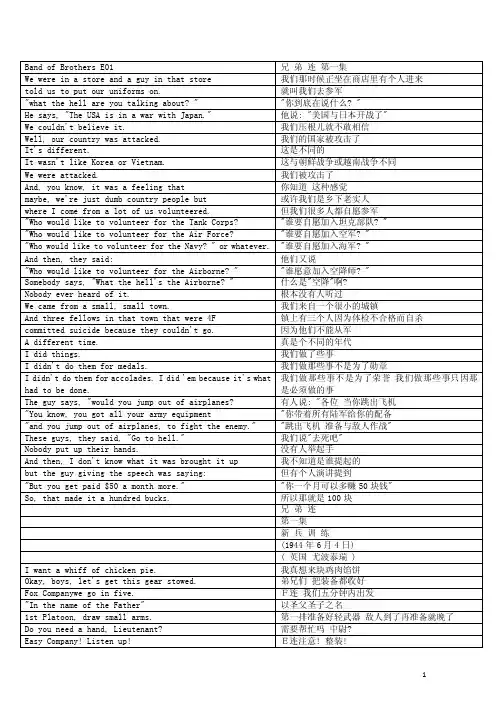
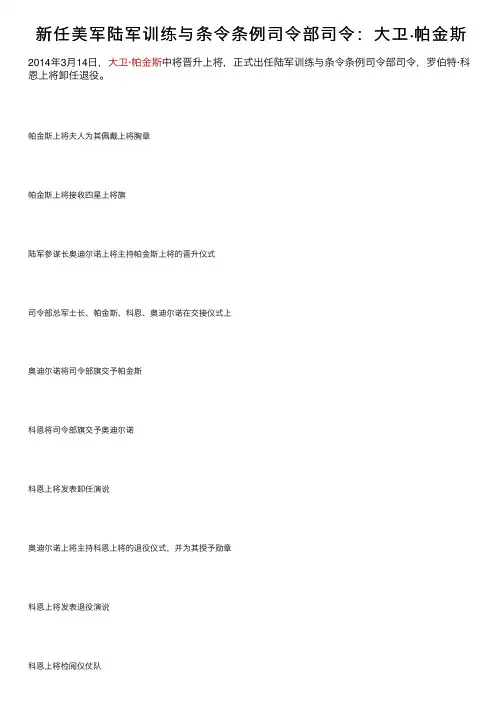
新任美军陆军训练与条令条例司令部司令:⼤卫·帕⾦斯2014年3⽉14⽇,⼤卫·帕⾦斯中将晋升上将,正式出任陆军训练与条令条例司令部司令,罗伯特·科恩上将卸任退役。
帕⾦斯上将夫⼈为其佩戴上将胸章
帕⾦斯上将接收四星上将旗
陆军参谋长奥迪尔诺上将主持帕⾦斯上将的晋升仪式
司令部总军⼠长、帕⾦斯、科恩、奥迪尔诺在交接仪式上
奥迪尔诺将司令部旗交予帕⾦斯
科恩将司令部旗交予奥迪尔诺
科恩上将发表卸任演说
奥迪尔诺上将主持科恩上将的退役仪式,并为其授予勋章
科恩上将发表退役演说
科恩上将检阅仪仗队。
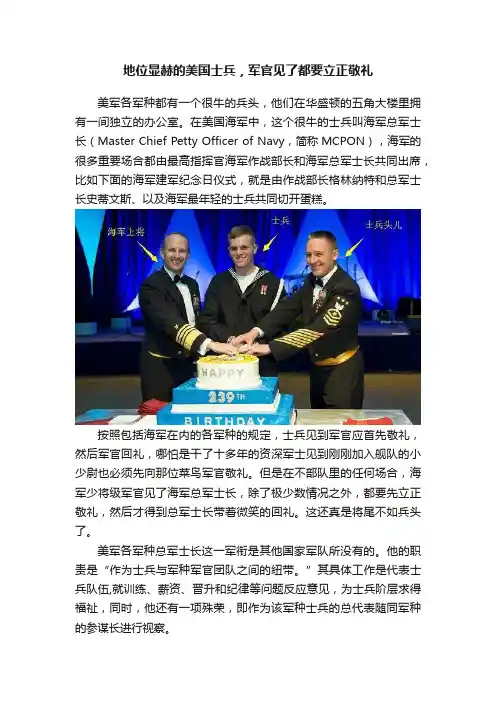
地位显赫的美国士兵,军官见了都要立正敬礼美军各军种都有一个很牛的兵头,他们在华盛顿的五角大楼里拥有一间独立的办公室。
在美国海军中,这个很牛的士兵叫海军总军士长(Master Chief Petty Officer of Navy,简称MCPON),海军的很多重要场合都由最高指挥官海军作战部长和海军总军士长共同出席,比如下面的海军建军纪念日仪式,就是由作战部长格林纳特和总军士长史蒂文斯、以及海军最年轻的士兵共同切开蛋糕。
按照包括海军在内的各军种的规定,士兵见到军官应首先敬礼,然后军官回礼,哪怕是干了十多年的资深军士见到刚刚加入舰队的小少尉也必须先向那位菜鸟军官敬礼。
但是在不部队里的任何场合,海军少将级军官见了海军总军士长,除了极少数情况之外,都要先立正敬礼,然后才得到总军士长带着微笑的回礼。
这还真是将尾不如兵头了。
美军各军种总军士长这一军衔是其他国家军队所没有的。
他的职责是“作为士兵与军种军官团队之间的纽带。
”其具体工作是代表士兵队伍,就训练、薪资、晋升和纪律等问题反应意见,为士兵阶层求得福祉,同时,他还有一项殊荣,即作为该军种士兵的总代表随同军种的参谋长进行视察。
美国军队的指挥,毫无疑问是由军官阶层来实施,但其具体战斗力的形成和培养却是军士和军士长阶层负责的。
军士和军士长们平时安排各种操练和演习,而军官则只管负责指挥等业务。
军士长们往往在部队里待的年头比自己部队的主管军官还长,胸前满都是勋章,而相形之下军官胸前的勋章还不及军士长多,士兵们也是和军士还有军士长的感情更为深厚。
应该说,美军的战斗力高下是由军士阶层决定的。
2016年9月刚刚成为最新一届美国海军总军士长的斯蒂文·乔纳多总军士长海军总军士长是美国海军士官中的最高级别(E9),也是士兵中的最高级别,他在五角大楼有自己的办公室,其地位相当于中将,这一点上远超过中国海军六级士官的地位。
美国海军的条例要求士兵见到军官时需要首先敬礼,按理说总军士长应该向资浅的初级军官们敬礼,但实际上每一位军衔没有到中将级别的海军军官都将首先向总军士长敬礼,前提是,只要你有了这颗徽章就可以,注意,这是一枚有着三颗银星的军士长徽章,全海军独此一份。
美国陆军发言稿原文尊敬的各位领导、官兵、亲爱的家属们:大家好!我是美国陆军的一名官兵,很荣幸有机会在此向大家发表讲话。
首先,我想对全体官兵和家属们表示我最诚挚的感谢,正是因为你们的付出和支持,才使得我们的陆军在历史上屡创佳绩。
作为美国陆军的一员,我们肩负着保家卫国、维护和平的神圣使命。
我们深知,面对复杂多变的国际形势和威胁,我们必须始终保持高度警惕,增强自己的战斗能力,为国家的利益和安全而努力。
过去的一年,我们陆军面临了许多挑战和考验。
从国内安全威胁到国际恐怖主义,我们都需要发挥我们的优势,保护我们的祖国。
我们的官兵们在各自的岗位上表现出色,勇敢地面对艰难险阻,并取得了显著的战绩。
我们为他们的英勇和奉献精神感到自豪。
然而,我必须承认,我们还面临一些内外部的困难和问题。
为了应对日益复杂的战略环境,我们需要更加注重战略规划和创新,推动装备和技术的发展。
同时,我们也需要更好地关心和照顾我们的官兵和家属,为他们提供更好的福利待遇和支持。
为了实现这些目标,我们必须紧密团结在一起,共同努力。
作为一个团队,我们必须始终保持战斗力和敏锐的战略眼光。
我们要鼓励创新和自由思考,培养领导能力和团队合作精神。
我们要加强对技术和装备的研发和使用,提高我们的战斗力和战略优势。
同时,我们要深入贯彻落实国家的国防政策和战略导向,加强与其他军种和盟友的合作。
我们要加强战略沟通和合作,共同应对全球安全挑战。
我们要与其他军种、警察部队和情报机构加强联系和合作,共同打击国际恐怖主义和非法活动。
为了提高陆军的战斗力和效率,我们还需要注重人力资源的开发和培养。
我们要加强对官兵的教育和训练,提高他们的专业技能和领导能力。
我们还要优化军事人才的选拔和晋升机制,保障人才的合理流动和培养。
除了战斗力的提升,我们还要关心和照顾每一位官兵和家属。
他们是我们最宝贵的财富,也是我们最重要的后盾。
我们要加强对官兵和家属的福利支持和关怀,为他们提供更好的工作和生活环境。
美式队列口令常见的美军战时军事用语(就是你说的口令)有三种:一种来自于无线电通话中防止误听的字母表代替词汇,26个字母的代替词汇如下:A-ALPHAH-HOTELN-NOVEMBERU-UNIFORMB-BRAVOI-INDIAO-OSCARV-VICTORC-CHARLIEJ-JULIETP-PAPAW-WHISKYD-DELTAK-KILOQ-QUEBECX-X-RAYE-ECHOL-LIMAR-ROMEOY-YANKEEF-FOXTROTM-MIKES-SIERRAZ-ZULUG-GOLFT-TANGO于是,有些常用的名词就用首字母表示了,比如常见的白宫:WhiteHouse->WH->WHISKYHOTEL;OntheMove->OM->OSCARMIKE;Target->T->TANGO;这也用于一些编号的表示,美军习惯使用字母编队,比如A组,B组。
经过代替词转换,一般直接称呼A组为ALPHA,B组为BRAVO,以此类推。
值得注意的是这中代词表示法已经广泛用于各种无线电通信,已经不仅仅是军事领域了,比如航空器之间的无线电通信也大多是用此表。
第二种就是简单的用首字母表示一个习惯短语,例如:RTB:ReturntoBase(返回基地)KIA:KilledinAction(行动中牺牲)MIA:MissedinAction(行动中失踪)APC:ArmoredPersonnelCarrier(装甲运兵车)第三种是纯军事名词,或者军事习惯用语,例如:OverWatch:指不同的兵种互相支援以获得优势OverLord:上级指挥部Mayday:用于船只或者航空器紧急情况的求救语Bogey:原意是雷达上的一个光点,一般指代敌机。
Roger/CopyThat:收到。
StaySharp:保持警惕。
以上列举得仅为常见的例子,军事用语经过了很长时间的传承和衍变,如有兴趣,可以查阅相关的资料。
美国陆军的战友情谊军人之间的战友情谊是美国陆军中最牢固、最持久的一种习俗,是会永远保留的。
战友们在一起服役,曾有过共同的难忘经历,如一起参加过战争,参加过大的行动,个人和集体都引以自豪,这样他们就拥有了战友情谊。
这是一种终极的归属感。
战友情谊是一种强有力的传统。
它是一种无形的力量,把凭着自豪感和自身能力为国家服役的人们紧密地团结在一起,成为可靠的伙伴和战友。
军官集合或周末会餐周末会餐或军官集合是一种特殊形式的战友情谊。
人人都希望听到这个指令:“所有军官17:30参加周末会餐。
”这意味着部队的军官们都要到当地俱乐部去喝酒、聊天。
周末会餐通常在星期五举行,这一惯例是让大家轻松愉快,开开玩笑,议论一下本周所发生的事情,发点小牢骚,缓和一下紧张的情绪。
其目的是在这种完全轻松的气氛下,让部队指挥官和军官们——有时还有他们的配偶——一起聚会,高高兴兴地庆祝这个星期顺利完成了任务。
尽管官方对饮酒持否定态度,尽管目前管控饮酒对公共行为的影响的法律越来越严厉,但这一传统依然存在。
大多数部队都安排了指定的司机或其他安全的交通工具。
军官们应该充分利用这些安排,这样就可以尽情享受这种传统所带来的乐趣,而不会对自己、周围的人,或者自己的事业造成任何不利影响。
但是仍要注意,参加、享受周末会餐,并不一定非饮酒不可。
所有军官都应参加此类聚会。
营部聚会和司令部演出营部聚会和司令部演出也是一种定期进行的惯例,尤其在军官及其家庭不住在营区的地区更是如此。
这些聚会的目的在于增进和加强了解,凝聚本部队的所有人员。
这种聚会在有新人到达部队、调离和提升的时候举行,有时仅仅是为了放松一下。
司令部演出是一个非正式说法,正式场合很少使用。
但是,如果营部聚会被非正式地通知为司令部演出,很显然这是希望你能出席。
如果这些活动费用超过了你现在的负担能力,或者你有充足的理由要去别的地方,可以告诉你的指挥官,请求允许缺席。
指挥官会认为你所说的合情合理,而不会认为你厌恶社交、不友好,或对上司的愿望无动于衷。
美国入籍宣誓原文欣赏爱因斯坦和他的女儿成为美国公民, 而不是在希特勒的统治下返回德国。
1940年10月1日美国入籍宣誓:'I hereby declare, on oath, that I absolutely and entirely renounce and abjure all allegiance and fidelity to any foreign prince, potentate, state, or sovereignty of whom or which I have heretofore been a subject or citizen; that I will support and defend the Constitution and laws of the United States of America against all enemies, foreign and domestic; that I will bear true faith and allegiance to the same; that I will bear arms on behalf of the United States when required by the law; that I will perform noncombatant service in the Armed Forces of the United States when required by the law; that I will perform work of national importance under civilian direction when required by the law; and that I take this obligation freely without any mental reservation or purpose of evasion; so help me God.'译文:我在这里郑重的宣誓完全放弃我对以前所属任何外国亲王、君主、国家或主权之公民资格及忠诚,我将支持及护卫美利坚合众国宪法和法律,对抗国内和国外所有的敌人。
美国海军陆战队步枪兵信条美国海军陆战队步枪兵信条(此信条于第二次世界大战期间起草,应该是在1941-1942年间。
以后用精简的版本,但原始版本是最经常使用的。
)这是我的步枪。
虽有很多相似的,但这一把是我的。
我的步枪是我的挚友,如同我的生命。
我将运用它如同运用我的生命。
步枪没了我便是废物,我没了步枪便成废人。
我将准确地发射我的步枪,我将比敌人打得更准,我将在他击中我之前击中他,我会击中的。
我与我的步枪知道,战争中不论发射多少弹药,制造多少巨响,激起多少硝烟,都是没意义的。
只有命中敌人才有意义。
我们会命中的。
我的步枪是人性的,就像我一样,因为它如同我的生命。
因此我将像对兄弟一样地了解它。
我将了解它的弱点,它的强项,它的构成,它的配件,它的准星和它的枪管。
我将使我的步枪保养完善,就如同我一般整装待发。
我们会成为彼此的一部分。
在上帝面前我对这信条宣誓。
我与我的步枪是国家的保卫者,我们是敌人的克星,我们将拯救我的生命。
但愿如此,直到美国获胜,没有敌人,只有和平。
《美国士兵信条》我是一名美国士兵。
我是一个战士和一个团队的成员。
我为美国人民服务、以军队价值观为生活准则。
我会永远把任务作为第一使命。
我永远不会接受失败。
我永远不会放弃。
我永远不会离开一个倒下的战友。
我守纪律,身体和精神上强悍,训练有素和精通业务。
我永远保养我的武器、我的设备和我自己。
我是一个专家、我是一个职业军人。
我随时准备部署,参与,在肉搏战中消灭美利坚合众国的敌人。
我是一个自由和美国生活方式的捍卫者。
我是一名美国士兵。
“我永远不会接收失败。
”最常背诵的是这三条“我永远不会接受失败。
我永远不会放弃。
我永远不会离开一个倒下的战友。
”最常背诵的是这三条“我永远不会接受失败。
我永远不会放弃。
我永远不会离开一个倒下的战友。
”美国陆军游骑兵信条。
游骑兵英文是RANGER,共六个子母,而这六个子母也正好是六句话的开头子母。
Recognizing (认识):(我)认识到自己是志愿加入游骑兵,并完全了解所选择职业的危险程度。
温德尔菲蒂格简介
温德尔菲蒂格(Wendell Fertig,1900年12月16日-1975年3月24日)是美国陆军军官,曾在二战期间在菲律宾担任游击队领袖,以及战后成为菲律宾独立运动的领导者之一。
他在1941年被派往菲律宾担任陆军军官,并在珍珠港事件爆发后,他指挥了一支由美国和菲律宾士兵组成的游击队抵御日军的进攻,并在菲律宾岛屿上打游击战。
他在菲律宾当地博得了热烈反响,广受民众拥戴。
战争结束后,菲律宾获得了独立,但却陷入了混乱和内战,菲律宾共产党和其他武装组织对政府发动了叛乱。
温德尔菲蒂格成为菲律宾反叛武装的领袖之一,他积极地支持抗议活动和游行示威,呼吁政府解决民众关心的问题。
1975年,温德尔菲蒂格在菲律宾去世,給人留下了深刻的印象。
他被并场纪念,被称为“最伟大的游击队领袖之一”,是一位受到菲律宾人民爱戴的美国军人。
美国陆军军官的服役誓言
大多数人类文化都非常重视誓言,美国陆军文化也不例外。
有两个原因。
首先,指挥官的言论往往决定着士兵的生死;即使在和平时期,即使在驻地,指挥官的行为都会给士兵留下印象,或给士兵做出示范,这些印象或示范会在未来战场上产生重大影响。
指挥官的言论必须无懈可击。
誓言是所有诺言中最神圣的。
美国军人在服役或再次服役时,必须立下以下誓言:
我庄严宣誓,我将支持并捍卫美利坚合众国宪法,反对国内外一切敌人的侵害;我将信守并忠于宪法;我将根据条例和《军事司法统一法典》之规定,服从美利坚合众国总统的命令和上级指挥官的命令。
愿上帝保佑我。
陆军军官立下以下誓言:
我(姓名),已被任命为美国陆军军官(军衔),我庄严宣誓,我将支持并捍卫美利坚合众国宪法,反对国内外一切敌人;我将信守并忠于宪法;我自愿接受这一职责,内心毫无隐讳,也无意逃避;我将彻底而忠实地履行我将担负的职责。
愿上帝保佑我。
二者之间的区别很明显,但其意义或许不太明显。
不过,首先让我们找出所有美国军人的共同之处。
所有美国军人必须支持并捍卫美国宪法,防止其遭到国内外敌人破坏,忠诚于美国式的政府和生活。
这要求勇气、承诺、自律、无私,以及对国民的尊重。
军官誓词与士兵誓词的差异——军官誓词中省略了“服从”——决定了陆军军官与士兵之间的差别。
军官从法律上必须同样受《军事司法统一法典》中服从命令要求的约束,这和士兵一样,但从誓词上看,他们从道德上不受约束。
虽然乍一看,这似乎是“矛盾的思想”,其实不然。
军官的任免是由美国人民(包括士兵)通过国会众议员来审批的,他们肩负巨大的道德责任,即知道何时可以不服从命令。
任何体制,无论如何深思熟虑,无论看上去如何完善,都不可能像变戏法一样制定出适应所有情况的规则。
陆军条例、命令、条令等基本上总是正确的,但是,无论什么法典,其逻辑或判断力有时候可能也需要一些变化。
这时候就需要军官的参与。
军官应当运用合理的判断,有时候——这种情况很少,但并不是没有——需要他们打破常规或进行变通;需要他们不执行那些当时不符合陆军最高利益的指令、规章和命令。
这是一名军官所能承担的最巨大的责任。
这种道德使命绝不能用来获取个人利益或者达到其他罪恶目的。
而且,尽管军官从道德上说拥有可以不执行命令的权力,但仍然要为自己的行为承担法律和道义上的责任。
如果某一位军官在特殊情况下做出了打破常规的判断,他的主官有权决定是否行使自己的裁决权来对其进行起诉。
这听起来显得有些冒险,事实上确实如此。
绝对不要轻易做出不执行命令的决定,对于每一项命令、指令、标准作战规定和规章,正确的态度几乎总是迅速愉快地服从。
但是,知道什么时候不能服从——并且坚持这么做——这正是美国陆军军官与士兵之间的本质区别。
在美国陆军中,这种审时度势,能够完整而准确地理解这些决策在法律与道德上会造成何种影响的能力,是求之不得的。